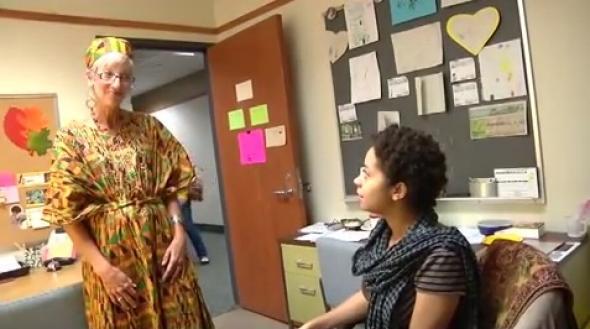It’s Lakisha Wisniewski’s first day in the “Diversity Department” at Kraka University, and there to welcome her is Dr. Kimball, the school’s self-proclaimed “diversity specialist.” A white woman decked out in a dashiki and kufi, Dr. Kimball fails to recognize a photo of Angela Davis—“Is she a rapper?”—before asking if Lakisha is “fully black.”
This is but one of the facepalm-worthy scenes in the first episode of the new Web series Tales from the Kraka Tower, created by University of South Florida MA student Aphrodite Kocieda, who also plays Lakisha. It’s a laugh-out-loud funny (and stroke-inducing enraging) look at race and privilege in the academy—a must-watch for anyone who enjoys the cult hit The Misadventures of Awkward Black Girl, and anyone who believes barbed satire to be an effective weapon in the fight against everyday prejudice.
Kocieda—who just defended her MA in communication with a thesis about race, gender, and the “Slutwalk” phenomenon—worked with no budget and cast her grad-student friends in the series, which she created to stimulate discussion about exclusion in academia, an industry we often think of—erroneously—as a “politically correct” fortress of progressivism. Instead, Kocieda explains, many academics—such as scholars of color, or scholars with disabilities—discover that “the academy disciplines you in a way where you can be political as long as you stay within the lines,” lines created by a mainstream that is often far from inclusive.
For example, it might surprise viewers outside of academia that the existence of African-American studies departments does not mean that the university is a welcoming environment for black scholars. Rather, Kocieda explains, the so-called identity politics disciplines are “not proof of our success, but should be a reminder of how far we have to go,” and of the fact that “mainstream” academic curricula still exclude minorities.
Kocieda’s tool of choice in highlighting the isolating experience of “those labeled ‘diverse’ ”—in college, grad school, and the professoriate—is wicked satire of several key culprits in this isolation: ableism, tokenism, and being treated as “exotic” (as Dr. Kimball, played by Ariane Anderson, describes Lakisha whilst asking about her hair).
The outsized characters also include Sam (Kyle Romano), a disabled grad student made to hold his office hours in an elevator, and Dr. Akintola, a black senior professor in the Diversity Department whose Stockholm Syndrome at Kraka University is so acute that he proclaims that race, class, and gender no longer exist. His “proof” that “Black people have been free for about 400 years”? “We’ve got Eric Holder, who talks about guns!” Dr. Akintola’s character may be exaggerated, Kocieda says, but “his advice to Lakisha is very real: ‘My job is to teach you how to write absolutely nothing.’ He even tells her to just ‘be a bag of black skin.’ ”
As for that title, and its critical reference to the term some racists believe is equivalent to the n-word? As Kocieda says (referencing an epic Louis C.K. bit), “If you’re offended by the term ‘cracker,’ you really have to re-evaluate your understanding of American history.”
Kocieda plans on producing at least six episodes, which Kocieda hopes will “reignite the activist spirit in any minoritized person who feels defeated or depressed because of daily microaggressions.” Such microagressions, she says, are unsurprising in an academy that operates not unlike the suburbs in which Lakisha grew up: “There’s an appropriate way to act, an appropriate way to speak, and appropriate subjects to talk about. There’s a desire to attain prestige through publications, and a desire to quietly settle down through tenure.” And, of course, “There’s a hell of a lot of white people.”
